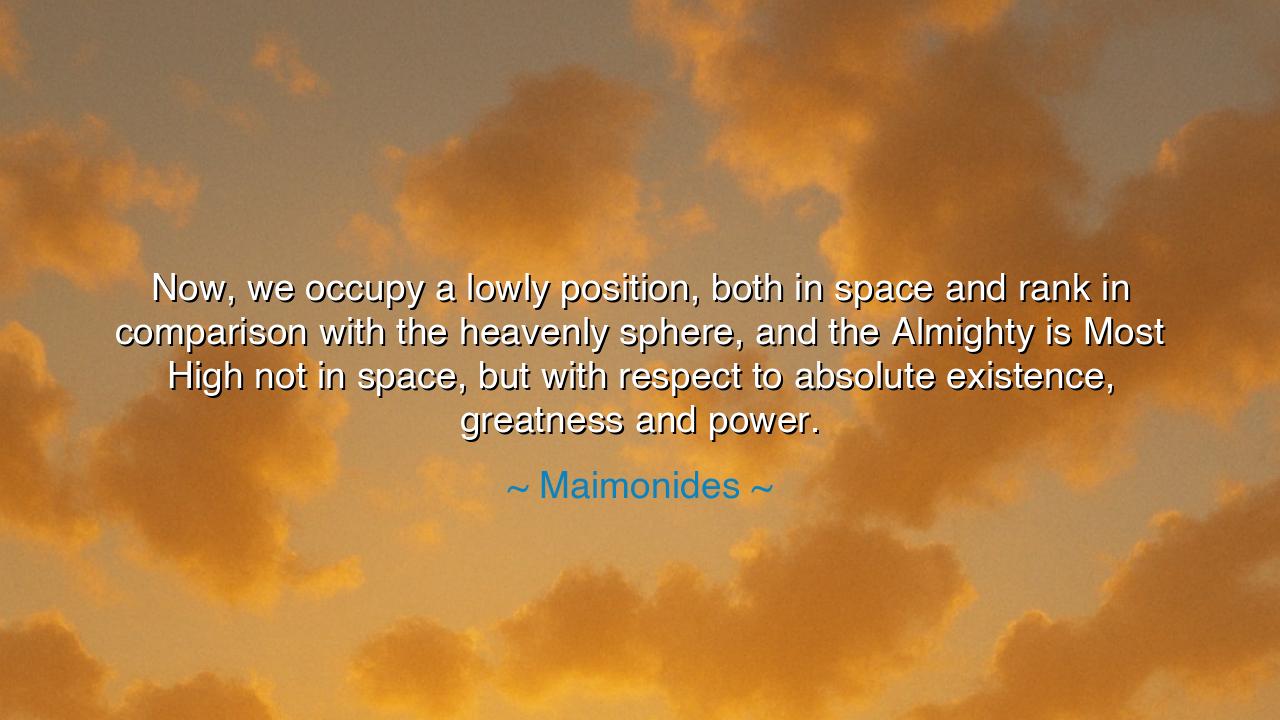
Now, we occupy a lowly position, both in space and rank in
Now, we occupy a lowly position, both in space and rank in comparison with the heavenly sphere, and the Almighty is Most High not in space, but with respect to absolute existence, greatness and power.






The words of Maimonides—“Now, we occupy a lowly position, both in space and rank in comparison with the heavenly sphere, and the Almighty is Most High not in space, but with respect to absolute existence, greatness and power.”—resound like a trumpet of humility across the centuries. They call us to remember our smallness, yet also to glimpse the majesty that lies beyond the reach of our hands and the vision of our eyes. This is no mere observation of the stars, but a reminder that the Creator transcends the physical realm, that His greatness is not bound by height, distance, or location, but by the eternal nature of His existence, greatness, and power.
In these words, Maimonides unites the insights of philosophy and the devotion of faith. He speaks as one who had gazed upon the vastness of the heavens and felt the weight of humanity’s insignificance, yet also as one who recognized that our true measure is not in our position in the cosmos, but in our relationship to the Eternal. The heavenly sphere—the stars, the planets, the endless firmament—appears lofty and glorious, but even these dazzling lights are finite. The Almighty, however, is beyond measure, existing in a realm untouched by space or time, reigning in absolute majesty.
Consider the story of Blaise Pascal, who centuries later echoed this same humility when he wrote of man’s fragile existence between the infinity of the cosmos and the abyss of nothingness. He marveled that though man is but a reed, the frailest thing in nature, he is a “thinking reed”—and by thought, he can grasp the grandeur of the universe and the God who created it. Just as Pascal trembled at the vastness of the heavens, so too did Maimonides, but he went further, teaching that the greatness of God is not to be compared to stars or space, for such comparisons fall short. God is Most High, not in distance, but in essence.
The emotional force of this teaching lies in its paradox: we are lowly, yet capable of reaching upward in understanding; we are dust, yet our dust is breathed upon by divine reason. To dwell in humility does not mean despair, but clarity. For if we are small, then our pride is foolish; if God is infinitely great, then our hope is secure, for His power surpasses the strength of every obstacle and the weight of every burden. True wisdom begins with this humility—knowing that we are not the center of existence, yet we are beloved within it.
This truth also teaches us reverence. When kings and emperors of old raised monuments, towers, and temples to show their might, their works crumbled, their names faded, and their power dissolved. But the One who transcends space and time endures forever. The lesson of history, carved into the ruins of fallen empires, is that human greatness without reverence for the divine is fleeting. Maimonides calls us to turn our gaze away from the illusion of worldly rank and toward the eternal majesty of God.
What, then, shall we do with this wisdom? First, we must cultivate humility, recognizing that though we are small in the vastness of creation, we are not without worth. Second, we must seek to align ourselves with the eternal by living lives of integrity, compassion, and reverence. Third, we must resist the temptation to measure greatness by status or possessions, and instead measure it by our closeness to truth, our service to others, and our faithfulness to what is eternal.
Let each one who hears this teaching take it to heart: do not be deceived by the glitter of earthly honors nor cast down by your lowly station. Lift your eyes to the Most High, who is beyond space, beyond rank, beyond all earthly measure. Anchor your soul in His greatness, and you will find strength when your strength fails, hope when your hope falters, and peace when the world grows restless.
Thus, the wisdom of Maimonides becomes a torch to guide our steps: we are lowly in space, yet noble in calling; we are fleeting in time, yet touched by the eternal. To know this is to walk in both humility and confidence, for in our smallness we discover the boundless majesty of God.






AAdministratorAdministrator
Welcome, honored guests. Please leave a comment, we will respond soon